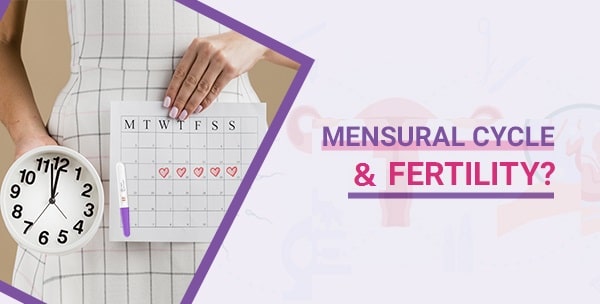One of the very common questions asked by the OB/GYN’s to their patient is “when did you get your last period or the first day of your last menstruation?” Isn’t it? Yes, this is the common and vital question associated with the fertility related matter. If you have been planning to have baby and have been trying to get pregnant without success, the answer of the above question could provide significant imminent into the aspects central to the menstruation and pregnancy such as proper phase of ovulation and hormonal imbalances.
A newborn baby girl has up to 450,000 eggs stored in her ovaries. When she starts her periods between the ages of about 10 and 14, one of these eggs ripen each month. The egg is released from the ovary and caught by the ferny ends of the fallopian tube, which transports it, using a gentle rippling motion, along to the uterus (womb). If the egg is fertilized by a sperm along its journey, it will be down once it reaches the uterus and grow into a baby and a placenta. If fertilization doesn’t take place, the egg will be flushed out, along with the lining of your uterus, when you have your period.
What’s a Normal Menstrual Cycle?
An average menstrual cycle lasts 28 days – that’s counting from the first day of one period to the day before the next. Some women have much shorter cycles, possibly lasting only 23 days, and some have much longer ones, lasting up to 35 days. Cycles which are shorter or longer than this are probably not normal, and you should see your GP. You should also see your GP if you bleed between periods or after sex.
Normal menstrual cycle
Days: 21 to 33 days
Ovulation Indicator: If a woman has regular cycle that indicates the ovulation is occurring.
What normal menstruation tells your specialist? If you have normal cycles that reflect all the sex hormones are balanced supporting natural conception.
How the Hormones Work?
Your menstrual cycle is under the control of an array of hormones produced in various parts of the body:
- Gonadotrophin-releasing hormone (produced in the hypothalamus, which is in the brain)
- Follicle stimulating hormone (produced in the pituitary gland, which is also in the brain)
- Luteinising hormone (produced in the pituitary gland)
- Estrogen (produced in the ovaries)
- Progesterone (also produced in the ovaries)
The whole process starts in the brain. The hypothalamus produces gonadotrophin-releasing hormone (GnRh), which travels to the pituitary gland and signals it to release follicle-stimulating hormone (FSH). FSH is carried round the body in the bloodstream and stimulates the ovaries to start ripening eggs. Between 15 to 20 egg-containing sacs, called follicles start to mature in the ovaries. One follicle (or very occasionally, two or more) grows faster than all the others.
FSH also stimulates the ovaries to produce estrogen. This encourages the eggs to mature and starts to thicken the lining of the uterus so that it’s ready to support a pregnancy, should fertilization occur.
Ovulation: the Egg is Released
As estrogen level raises, the level of FSH falls temporarily and then rise again – accompanied by a huge surge of luteinising hormone (LH) from the pituitary gland. It is this hormone that triggers ovulation – the moment that the most mature egg bursts out of its sac and away from the ovary. The egg is immediately caught up by the ends of the fallopian tube.
Normally your cervix (the neck of your uterus) produces thick, opaque mucus that sperm can’t penetrate. Just before ovulation, though, estrogen changes the mucus so that it becomes thin, clear and stretchy. This allows the sperm to swim through the cervix into the uterus and up to the fallopian tubes where fertilization may take place.
After Ovulation
In the ovary, the now empty follicle collapses and becomes a corpus luteum. This small yellow mass of cells starts to produce the hormone progesterone. Progesterone changes the mucus in the cervix so that, once again, it becomes impenetrable to sperm. It also acts on the lining of the uterus, which becomes thick and spongy as a result of an increased blood supply, ready to receive a fertilized egg. As levels of progesterone rise, your breasts may feel stretched and tingly. The pituitary gland stops producing FSH so that no more eggs mature in your ovaries.
If Fertilization Occurs
Once the motile sperm fuses into the egg’s wall and goes into the cytoplasm for division, fertilization soon starts. If the egg is fertilized in the fallopian tube, it will continue to travel to the uterus, where it beds down in the lining. At this implantation stage the fertilized egg is made up of about 150 cells. The journey from ovary to uterus takes about five days. Your progesterone levels will stay high and you may start to feel the early signs of pregnancy.
If Fertilization Doesn’t Occur
If the egg isn’t fertilized or doesn’t successfully implant, it starts to disintegrate and the corpus luteum shrinks. Your estrogen and progesterone levels drop and the lining of your uterus starts to produce prostaglandins. These chemicals cause changes in the blood supply to your uterus, breaking up the lining, and stimulating the uterus to contract. Your period starts and the lining of your uterus is shed along with the unfertilized egg, and your menstrual cycle starts again.
If the woman is not having a normal and regular menstrual cycle, no matter the duration of time the female is trying to conceive, it is mandatory to get evaluated by the doctor about the issue. Absence of the ovulation or irregular menstrual cycle makes pregnancy difficult to attain by the natural way.
Women, who are less than 35 years of the age with normal menstruation cycle and not gotten pregnancy after a year of trying to conceive, must see an infertility expert to know the exact reason and treatment. On the other hand, if the woman is above 35 and have been trying for six months without positive result, she should not wait for more try and seek the best infertility specialist for the remedy.
Bottom Line
Menstrual cycle and fertility directly is linked and without a regular or normal menstruation, attaining natural pregnancy becomes difficult, hence it is recommended by the doctor to go for the fertility assessment in order to know the exact cause behind the fertility issue. There are several reasons why a woman may not conceive – due to hormonal issues, ovulation issues, partner’s fertility issue and so, and these should be evaluated as soon as the couple realizes that they are facing issues during the conception.
If you are also facing fertility issues, then you can contact our support team for more information. You can fix an appointment with our specialist. We are We Care IVF Surrogacy one of the fertility agencies that provide basic and advanced fertility treatment including Ovulation stimulation, IUI treatment, IVF treatment, ICSI, PICSI, and additional IVF treatment at reasonable cost.




